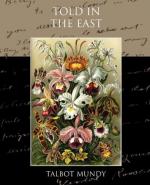“So the gods obey his orders, do they. Well, they’ve a queer sense of duty! What else does he prophesy?”
“About your soul, sahib, and the sentry’s soul.”
“That’s interesting! Translate!”
“He says, sahib, that for countless centuries you and your man shall inhabit the carcasses of snakes, to eat dirt and be trodden on and crushed, until you learn to have respect for very holy persons!”
“Is he going to have the ordering of that?”
“He says that the gods have already ordered it.”
“It won’t make much difference, then, what I do now. If that’s in store for me in any case, I may as well get my money’s worth before the fun begins! Tell him that unless he can give me a satisfactory reason for being here I shall treat him to a little more rifle-butt, and something else afterward that he will like even less!”
“He says,” explained the Beluchi, after a moment’s conversation with the fakir, “that he is here to see what the gods have prophesied. He says that India will presently be whelmed in blood!”
“Whose blood?”
“Yours and that of others. He says, did you not see the sunset?”
“What of the sunset?”
Brown looked about him and, save where the lantern cast a fitful light on the fakir and the sentry and the native servant, and threw into faint relief the shadowy, snake-like tendrils of the baobab, his eyes failed to pierce the gloom. The sunset was a memory. In that heavy, death-darkness silence it seemed almost as though there had never been a sun.
“`A blot of blood,’ he says. He says the order has been given. He says that half of India shall run blood within a day, and the whole of it within a week!”
“Who gave the order?”
“He answers `Hookum hai!’—which means `It is an order!’ Nothing more does the holy fakir say.”
“To the clink with him!” commanded Brown. “I’m tired of these Old Mother Shipton babblings. That’s the third useless Hindu fanatic within a week who has talked about India being drenched in blood. Let him go in to the depot under guard, and do his prophesying there! Bring him along.”
The sentry’s rifle-butt rose again and threatened business. The Beluchi gave a warning cry, and the fakir tumbled off his dais. Then, with the trembling Beluchi walking on ahead with the lantern, and Brown and the sentry urging from behind, the fakir jumped and squirmed and wabbled on his all but useless feet toward the guardroom. When they reached the tree where the goat had bleated, the Punjabi skin-buyer rose up, took one long look at the fakir and ran.
“Well, I’ll be!” exclaimed the sentry.
“You’ll be worse than that,” said Brown, “if you use that language anywhere where I’m about! I’ll not have it, d’you hear? Get on ahead, and open the door of the clink!”
The sentry obeyed him, and a moment later the fakir was thrust into a four-square mud-walled room, and the door was locked on him.




